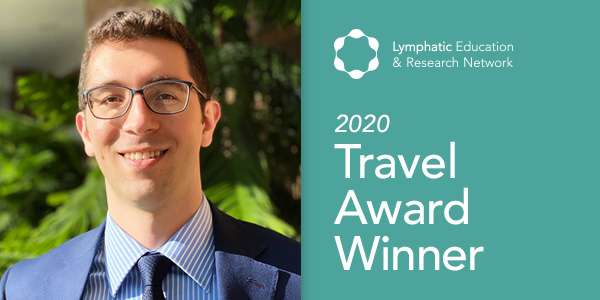Rafael Sanguinetti Czepielewski, currently a postdoctoral fellow at Washington University in St. Louis (USA), under the supervision of Prof. Dr. Gwendalyn Randolph, received a travel award and a poster award from LE&RN to attend the GRC Conference on Lymphatics. We asked Rafael to share his thoughts on that experience with us and to tell us a bit about his research and future plans.
What did you get out of the Lymphatic Conference? Why did you feel it was important to attend?
First, I would like to express my gratitude to LE&RN in supporting young scientists and developing our careers. The GRC Conference on Lymphatics is the main and most waited meeting for all lymphatic research aficionados and holds all the essential features of what makes science exciting – discoveries, vivid scientific discussions, collaborations across diverse fields. This year's meeting allowed me to interact with scientists that inspire me, having deep discussions about my findings and my future. Moreover, it will always be remembered to be the last conference many attended before the pandemic shutdown.
Being trained in another area, the meeting is a unique opportunity to discover the elemental questions and leaders of the field. Now that I attended several vascular meetings, it is evident how the science we do is flourishing and resulting in translational/clinical outcomes.
What are your areas of interest in research?
As an immunologist, my research focus comprises chronic inflammatory diseases. I am currently studying lymphatic alterations during the course of inflammatory bowel diseases. Despite the effects on immune cells, an inflamed environment alters large collecting lymphatic vessels, which normally channels substances absorbed and cells surveilling the intestine. These changes lead to the formation of extra lymphoid organs along these vessels, which block the lymphatic flow, hence their function. These lymphatic defects are unaccounted in the current clinical therapies, which bring new ways to perceive the disease.
What are your hopes and plans for your career and your research?
I am fascinated by the intricate process of how the coordinated movement of different immune cells in our body controls the equilibrium of our systems. For decades we focused on leukocytes, neglecting that other cells' behavior governs all interactions and decisions they make. The new era of lymphatic biology knowledge taught us that lymphatic endothelial cells are an active part of the system. I would love to inquire about how we can improve inflammatory conditions treatments via this view concept since it would be applied for many organs, conditions, and diseases. Hopefully, as an independent researcher, I can expand the concepts of what we learned in primary and secondary lymphatic disorders to more pathologies, and vice-versa.
Why do you believe that, in general, lymphatic research is important? What might the field accomplish within the next few years?
Although lymphatic biology is only now starting to bring attention from other science areas, I believe the new diverse "omics" technologies will establish the field as a key member of tissue function and homeostasis. Therefore, it will not be easy to think about an organ without considering its lymphatic counterpart.
Using genetic and protein arrays with single-cell resolution will find a plethora of tissue-specific lymphatic functions that will open venues for organ-specific treatment and manage. The same technologies will facilitate the screen and discover new drivers for primary lymphedema, directly helping patients, and restore lymphatic function on secondary lymphedema. Efforts like this award drive other fields to develop that knowledge, and I saw many examples in the latest meeting.
LE&RN programs, like LE&RN Travel Awards, are only possible because of our Partners and Supporting Members. Become a Supporting Member today.

